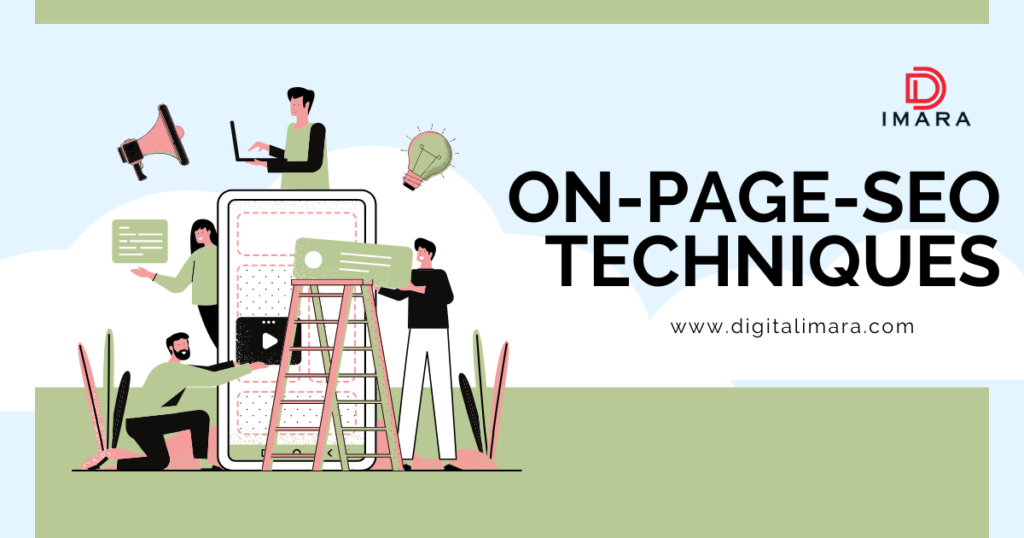In the world of digital marketing, SEO is the linchpin that can elevate your website’s visibility and drive organic traffic. When it comes to SEO, the on-page optimization of your content plays a pivotal role. In this comprehensive guide, we’ll delve into the best practices for on-page SEO techniques to help you climb the search engine rankings and attract more visitors to your website.

Table of Contents
- Introduction to On-Page SEO
- The Significance of On-Page SEO
- Keyword Research and Selection
- Crafting High-Quality Content
- Optimizing Title Tags and Meta Descriptions
- Heading Tags and Their Role
- Internal Linking Strategies
- Image Optimization for SEO
- Mobile-Friendly Design
- Page Loading Speed
- URL Structure and Permalinks
- Schema Markup: Structured Data
- User Experience and Dwell Time
- Social Sharing and Integration
- Regular Content Updates
- Avoiding Common On-Page SEO Mistakes
- Measuring On-Page SEO Success
- Conclusion: Your Path to On-Page SEO Mastery
Introduction to On-Page SEO
Kickstart your journey into the world of on-page SEO by understanding the basics. Learn what on-page SEO is, why it’s vital for your website’s success, and how it differs from off-page SEO.
The Significance of On-Page SEO
Discover why on-page SEO is the cornerstone of your search engine optimization efforts. Uncover its impact on the user experience, search engine rankings, and the bottom line of your business.
Keyword Research and Selection
Learn how to conduct thorough keyword research, identify high-value keywords for your content, and choose the right search terms that align with your business objectives.
Crafting High-Quality Content
Dive deep into the art of content creation. Explore strategies for producing valuable, informative, and engaging content that both users and search engines love.
Optimizing Title Tags and Meta Descriptions
Master the art of writing compelling title tags and meta descriptions that not only inform but also entice users to click on your search results.
Heading Tags and Their Role
Understand the hierarchy of heading tags and how to use them effectively to structure your content and improve readability.
Internal Linking Strategies
Uncover the power of internal links to guide users and search engines through your website while distributing link equity.
Image Optimization for SEO
Learn how to optimize images for a better user experience and improved search engine rankings while reducing page load times.
Mobile-Friendly Design
Explore the world of responsive design and mobile optimization to ensure your website caters to users on various devices.
Page Loading Speed
Discover the significance of page loading speed and strategies to make your website lightning-fast.
URL Structure and Permalinks
Get insights into creating clean, user-friendly URLs and permalinks that are both search engine-friendly and user-friendly.
Schema Markup: Structured Data
Learn how to use structured data to provide search engines with additional context about your content and improve your chances of earning rich snippets.
User Experience and Dwell Time
Delve into the importance of user experience and how longer dwell times positively affect your SEO efforts.
Social Sharing and Integration
Explore the benefits of integrating social sharing buttons to increase content visibility and reach a broader audience.
Regular Content Updates
Discover the significance of keeping your content fresh and up-to-date to maintain SEO performance.
Avoiding Common On-Page SEO Mistakes
Avoid pitfalls and blunders that can harm your on-page SEO efforts, from keyword stuffing to duplicate content.
Measuring On-Page SEO Success
Learn how to measure and track the success of your on-page SEO efforts through key performance indicators and analytics tools.
Conclusion: Your Path to On-Page SEO Mastery
Wrap up your journey with a concise summary, and encourage readers to apply their newfound knowledge to enhance their website’s SEO.
This comprehensive guide to on-page SEO techniques will provide valuable insights and actionable steps for readers looking to improve their website’s SEO. Remember to research, elaborate on each section, and provide practical examples to make this blog post a valuable resource for your audience.
